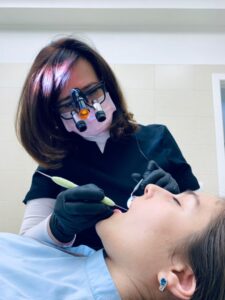Your oral cavity experiences reversible and irreversible changes due to the hormonal changes caused by pregnancy.
Some of those oral changes include gingivitis, gingival hyperplasia, pyogenic granuloma, and salivary changes.
Other than the physiological and systemic alterations that your body goes through during pregnancy, you also experience behavioral changes.
A recent study found that due to behavioral changes coupled with the increased need for energy, pregnant women modify their diet accordingly. Hence, during pregnancy, you crave more sweets, milk, and sour food, increasing the risk of dental caries.
Taking care of your oral health during pregnancy is especially important, because according to the Centers for Disease Control and Prevention, children of mothers who had a high number of untreated cavities during pregnancy were three times more likely to have cavities themselves.
So, what are some oral health challenges that pregnant women face?
Lack of knowledge and negative attitude toward dental care professionals are some barriers that women face while seeking oral care during pregnancy.
Poor maternal oral health can contribute to several pregnancy risks and endangers the dental health of the baby. Preterm delivery and low birth weight of the child are some conditions that are associated with a lack of dental care during pregnancy.
Some common dental health problems women face during pregnancy that require dental care by professionals are:
Dental caries
Due to frequent vomiting, the acidic nature of the oral cavity intensifies during pregnancy. This, in addition to the increase in consumption of sugary diet, puts pregnant women at a higher risk of developing dental caries.
To avoid dental caries, you should brush their teeth regularly with fluoride toothpaste and limit your sugary diet.
Periodontal disease
Periodontal disease, also known as gum disease, is a set of dental conditions that affect the gums. Some symptoms of periodontal disease include swollen or bleeding gums.
During pregnancy, the estrogen level in your body rises, which can lead to gingivitis and gingivitis hyperplasia.
To prevent periodontal disease, you should visit your dentist regularly, who will keep a check on your oral health and advise preventive measures accordingly.

Are dental procedures during pregnancy-safe?
With certain precautions, many routine and preventive dental procedures can be safely administered during pregnancy.
Scaling and root planning to treat periodontal disease such as gingivitis and gingivitis hyperplasia are also considered safe.
At West Hills Smiles, we have a group of highly trained dental professionals who provide dental care services to pregnant women with special care. We also offer emergency dental care for emergency cases. Visit our website or connect with us today at (818) 346-4303 to book an appointment.




